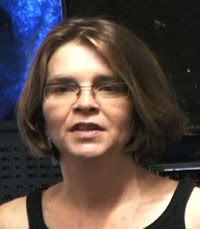 Last week I attended an event designed to raise awareness about the Willow Walker, a unique magazine produced for and by homeless people in Cambridge. It may soon have to close because its funding body, the Churches Housing Trust, has decided - bizarrely, in my opinion - that its activities and articles don't accord with the trust's Christian ethos.
Last week I attended an event designed to raise awareness about the Willow Walker, a unique magazine produced for and by homeless people in Cambridge. It may soon have to close because its funding body, the Churches Housing Trust, has decided - bizarrely, in my opinion - that its activities and articles don't accord with the trust's Christian ethos.As we prepared for a photoshoot arranged by the Cambridge News by planning out how to distribute letters painted on A4 paper that would spell out SAVE THE WILLOW WALKER, somebody noticed that there were 13 men and 2 women present in the building. Kirsten Lavers, the magazine's editor, currently going through a redundancy process that will end in January 2010, did some swift mental calculations and commented that this ratio was just about representative of the street community in Cambridge. In a discussion of why this should be so, one chap suggested the various processes following the breakup of a relationship. I found myself transported back to when homelessness was not a distant prospect for me.
To cut a long story short, shortly after moving to Cambridge from Glasgow I was hospitalised and eventually diagnosed with manic depression (bipolar affective disorder). While in hospital, our landlord sold our house to another landlord and eviction proceedings begun. This compounded the pressure on Maxima, who had been effectively coping as a single mother for some time, and it didn't help that the attitude of some of the mental health staff involved in my care was that marital breakup would be part of the natural progression of the consequences of my illness.
Happily, neither breakup nor homelessness occurred, but it is a chilling lesson into one of the many paths into homelessness: a (sometimes small) change in environmental conditions that throws a genetic switch, resulting in chaos.
Relationship breakdown and mental illness are but two of the ways to become homeless which are often discussed, but just as often kept at arms' length through an assumption that "it won't happen to me".
 The photo that was taken accompanied an article by the Cambridge News' Chris Havergal. Whereas we were quite optimistic after a donation of £4,000 from Cambridge University Press to ensure that the Autumn Willow Walker came out, Chris' article, entitled Blow to campaign to save voice of homeless, stated that Cambridge City Council's head of strategic housing, Alan
The photo that was taken accompanied an article by the Cambridge News' Chris Havergal. Whereas we were quite optimistic after a donation of £4,000 from Cambridge University Press to ensure that the Autumn Willow Walker came out, Chris' article, entitled Blow to campaign to save voice of homeless, stated that Cambridge City Council's head of strategic housing, Alan Carter, had announced that the Council did not wish to fund projects that duplicated services, citing Wintercomfort for the Homeless, a service where members of the street community can get some shelter and a feed. Wintercomfort - the brainchild of Henry Rothschild, WWII veteran and founder of the Primavera group of galleries, who died in May this year - is too tightly stretched to apply for additional funds for the Willow Walker.
Carter, had announced that the Council did not wish to fund projects that duplicated services, citing Wintercomfort for the Homeless, a service where members of the street community can get some shelter and a feed. Wintercomfort - the brainchild of Henry Rothschild, WWII veteran and founder of the Primavera group of galleries, who died in May this year - is too tightly stretched to apply for additional funds for the Willow Walker.The reason the Walker is unique is that, unlike, say, the Big Issue, it exists as a voice for homeless people in Cambridge and as such is also delivered to the statutory and voluntary agencies that provide se
 rvices for them. From the Willow Walker has sprung Homeless Truths, a radio show for and by homeless people, on which a police representative was once interviewed, getting a viewpoint of which the street community can be suspicious into the heart of that community; Cambridge Link-Up is another shoot, recycling everyday items with pleasing and surprising results; and Street Voices has not only released a double CD to critical acclaim, but has shown the big-heartedness of people who are or have been homeless by p
rvices for them. From the Willow Walker has sprung Homeless Truths, a radio show for and by homeless people, on which a police representative was once interviewed, getting a viewpoint of which the street community can be suspicious into the heart of that community; Cambridge Link-Up is another shoot, recycling everyday items with pleasing and surprising results; and Street Voices has not only released a double CD to critical acclaim, but has shown the big-heartedness of people who are or have been homeless by p erforming concerts of words and music for Homelessness Sunday and Leprosy Sunday, as well as performing a major concert at Cambridge Guildhall. The magazine once ran an article by Dave Whitman, of Chicago cultural arts project Temporary Services; Dave remains a supporter.
erforming concerts of words and music for Homelessness Sunday and Leprosy Sunday, as well as performing a major concert at Cambridge Guildhall. The magazine once ran an article by Dave Whitman, of Chicago cultural arts project Temporary Services; Dave remains a supporter. Every process needs a stable pivot, and as far as the Willow Walker is concerned, that pivot is Kirsten Lavers. She is an unwavering voice of advocacy for homeless people in Cambridge, nad her skills will be needed more than ever when - given the significant concomitancy of mental distress with homelessness - we've lost the Clubhouse, two acute psychiatric wards and a rehabilitation house; and the city's Mental Health Resource Centre is soon to go. To let the Willow Walker fail would be to score a "fail" in enlightened self-interest. The Cambridge Link-Up website puts it best:
Every process needs a stable pivot, and as far as the Willow Walker is concerned, that pivot is Kirsten Lavers. She is an unwavering voice of advocacy for homeless people in Cambridge, nad her skills will be needed more than ever when - given the significant concomitancy of mental distress with homelessness - we've lost the Clubhouse, two acute psychiatric wards and a rehabilitation house; and the city's Mental Health Resource Centre is soon to go. To let the Willow Walker fail would be to score a "fail" in enlightened self-interest. The Cambridge Link-Up website puts it best: We believe that homeless people are a massively untapped resource of skills, creativity, knowledge and experience able to contribute positively to their community.
Kirsten is currently having funding bids put together in a last-ditch surge to save this important and aspirational institution which is already woven into Cambridge's venerable fabric. Wherever you are, please show your support for it by respectfully emailing Alan Carter, head of strategic housing for Cambridge City Council, at Alan.carter@cambridge.gov.uk, and please copy it to Kirsten Lavers at editorial@willowwalker.org. And if you are or know a funder, please get in touch with Kirsten.
Related posts:
Homeless not hopeless
Catching Street Voices
Both Sides of the Tracks
Save the Willow Walker











I'm totally shocked. A newspaper for homeless by homeless. Wow indeed. If not a home, then recognition for maintaining thinking skills.
ReplyDelete(and)Thank you, for being so candid about your personal life.
Thanks, Linda! For me, there are two shocking thngs:
ReplyDelete1)that an organisation called the Churches Housing Trust should say that a magazine and process which gives people hope who had previously next to no hope should refuse to fundraise for it on the grounds of "Christian ethos"; and
2)That senior council officials should say of this unique organisation that it "duplicates" existing services, which it doesn't.
I really don't know how my wife coped while I was ill, it was as if pressure upon pressure was beng piled on her.